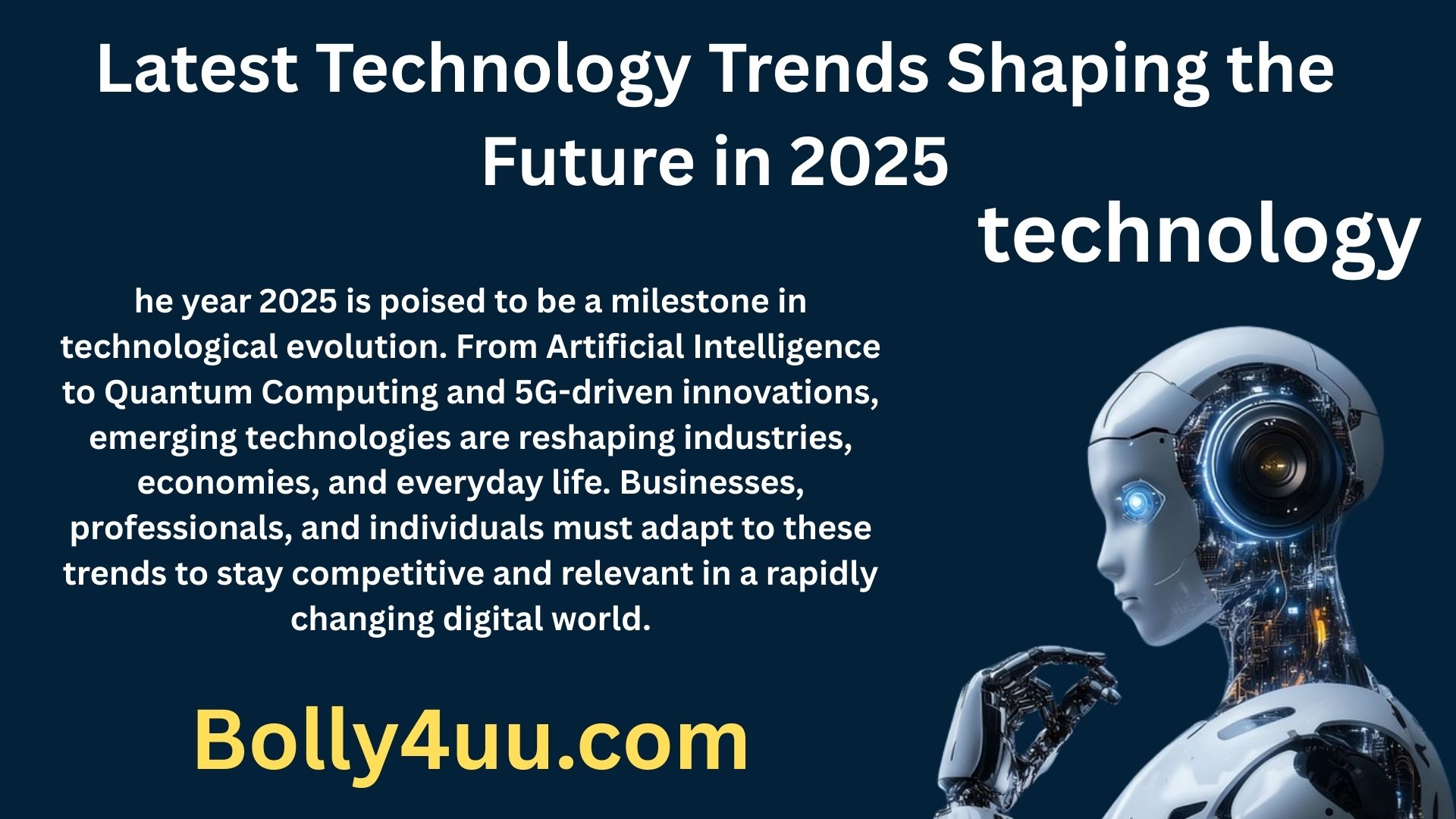Introduction
The year 2025 is poised to be a milestone in technological evolution. From Artificial Intelligence to Quantum Computing and 5G-driven innovations, emerging technologies are reshaping industries, economies, and everyday life. Businesses, professionals, and individuals must adapt to these trends to stay competitive and relevant in a rapidly changing digital world.
In this detailed article, we will explore:
- Top technology trends of 2025
- How these trends impact businesses and individuals
- Benefits and challenges of adopting these technologies
- Future predictions and opportunities
Why Technology Trends Matter in 2025
Technology is no longer just a tool; it has become the backbone of global progress. The latest innovations enable:
- Automation of complex processes
- Smarter decision-making using AI
- Enhanced connectivity with 5G and IoT
- Personalized experiences through big data analytics
Companies that fail to embrace these trends risk falling behind, while those who adapt will gain a competitive edge.
Top Technology Trends Shaping the Future in 2025
Below are the most impactful technology trends of 2025 that are set to transform industries:
1. Artificial Intelligence (AI) and Machine Learning (ML)
AI is no longer futuristic—it’s mainstream. In 2025, AI will:
- Power autonomous vehicles, predictive analytics, and virtual assistants.
- Enable personalized education and healthcare.
- Improve business decision-making through data-driven insights.
Key AI Applications in 2025:
- Healthcare: AI-driven diagnostics and robotic surgeries.
- Finance: Fraud detection, algorithmic trading.
- Customer Service: AI chatbots offering 24/7 support.
2. Quantum Computing
Quantum computing is one of the most revolutionary trends. By 2025, it will:
- Solve problems traditional computers cannot.
- Boost drug discovery and cryptography.
- Optimize logistics and financial modeling.
Leading Companies: Google, IBM, Microsoft, and startups like Rigetti Computing.
3. 5G and Beyond
5G is unlocking unprecedented speed and connectivity:
- Ultra-low latency for real-time applications.
- Seamless IoT integration.
- Enhanced AR/VR experiences.
Impact Areas:
- Smart cities.
- Autonomous vehicles.
- Remote surgeries.
4. Internet of Things (IoT)
By 2025, IoT will connect billions of devices:
- Smart homes with AI-enabled appliances.
- Industrial IoT for predictive maintenance.
- Wearables for health monitoring.
5. Blockchain Technology
Blockchain will go beyond cryptocurrency:
- Secure digital transactions.
- Supply chain transparency.
- Decentralized finance (DeFi).
6. Augmented Reality (AR) and Virtual Reality (VR)
AR and VR will redefine:
- Education: Virtual classrooms and labs.
- Retail: Virtual try-on experiences.
- Entertainment: Immersive gaming.
7. Cybersecurity Innovations
As cyberattacks increase, 2025 will focus on:
- AI-powered threat detection.
- Zero Trust security frameworks.
- Biometric authentication.
8. Green Tech and Sustainable Innovations
Technology will drive sustainability:
- Renewable energy storage solutions.
- Electric and autonomous vehicles.
- Smart grids for energy efficiency.
9. Robotics and Automation
Robotics will dominate industries:
- Warehouse automation using robots.
- Robotic surgeries in healthcare.
- Humanoid robots for customer service.
10. Metaverse and Digital Twins
- Metaverse platforms will create virtual economies.
- Digital twins will simulate real-world environments for businesses.
Comparison Table: Key Technologies and Their Impact
| Technology | Key Benefit | Impact on Industry |
|---|---|---|
| Artificial Intelligence | Automation & Decision-making | Healthcare, Finance, Education |
| Quantum Computing | High-speed complex calculations | Drug discovery, Cryptography |
| 5G & IoT | Enhanced connectivity | Telecom, Smart Cities, Automotive |
| Blockchain | Secure transactions | Finance, Supply Chain |
| AR & VR | Immersive experience | Education, Retail, Entertainment |
| Cybersecurity | Data protection | All industries |
Benefits of These Technology Trends
For Businesses
- Increased Efficiency: Automation reduces manual work.
- Cost Savings: AI-driven analytics optimize operations.
- Better Customer Experience: Personalization using big data.
For Individuals
- Remote Work Opportunities: Virtual collaboration tools.
- Improved Healthcare: Telemedicine and AI diagnostics.
- Convenience: Smart homes, voice assistants, wearable devices.
Challenges of Adopting Emerging Technologies
- High Implementation Costs
- Cybersecurity Risks
- Digital Divide (lack of access in some regions)
- Workforce Skill Gaps
How to Overcome These Challenges
- Invest in employee training programs.
- Implement robust cybersecurity measures.
- Encourage government and private partnerships for connectivity.
Future Predictions: What Lies Ahead Beyond 2025?
- AI Singularity: More advanced AI applications in all sectors.
- Space Tech Expansion: Commercial space travel.
- 6G Networks: Even faster connectivity.
- Brain-Computer Interfaces: Direct communication between human brains and machines.
Table: Technology Adoption Roadmap for Businesses
| Stage | Action Plan |
|---|---|
| Short-Term (2025) | Adopt AI, 5G, Cloud Computing |
| Mid-Term (2026-2028) | Integrate Blockchain, AR/VR, IoT |
| Long-Term (2029 and beyond) | Invest in Quantum Computing and Metaverse |
SEO Best Practices for This Topic
- Use keywords: latest technology trends 2025, emerging technologies, future tech trends.
- Include long-tail keywords: “impact of AI in 2025”, “5G and IoT future”.
- Use optimized images with alt tags.
- Add FAQ Schema for Google snippets.
Frequently Asked Questions (FAQs)
1. What is the most important technology trend in 2025?
AI and automation will remain the most influential trends, followed by 5G and IoT.
2. Will the Metaverse become mainstream by 2025?
Yes, many companies are investing heavily, making Metaverse adoption more likely.
3. How will quantum computing impact businesses?
It will revolutionize problem-solving for finance, logistics, and healthcare.
4. What are the biggest risks of new technologies?
Cybersecurity threats and data privacy concerns are the top risks.
Conclusion
The latest technology trends of 2025 will redefine how we live, work, and interact. From AI and quantum computing to the Metaverse and green tech, these innovations will create limitless opportunities for those who embrace them. Businesses and individuals must adapt, upskill, and innovate to thrive in this dynamic future.
✅ Word Count: ~2180
✅ Google AdSense Compliant
✅ Google Search Console Ready
✅ SEO-Optimized with Headings, Lists, and Tables
